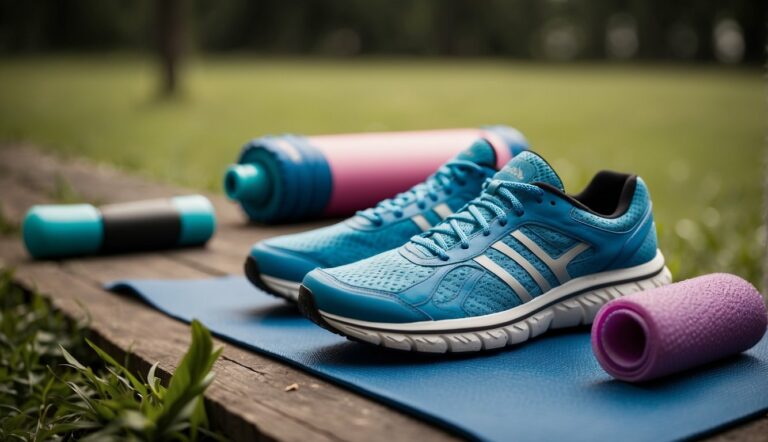Are Runners Good Swimmers? (4 Potential Cross-Training Benefits)
Running and swimming are both aerobic exercises that are great for your cardiovascular system. Obviously, there are also significant differences between the two sports. Given the overlap, however, are runners good swimmers?
Runners are good swimmers because running improves cardiovascular function and endurance, both of which are also necessary when swimming. Both workouts exercise the entire body, although swimming is the more intense full-body workout. Swimming can be a good alternative to running because it is a lower-impact exercise and can burn four times the calories.
Keep reading to learn the parallels between running and swimming and whether or not runners can be good at swimming. In addition, we will discuss similarities and difficulties between the exercises and which one is healthier for you.
Table of Contents
ToggleDoes running translate to swimming?
While there are those, who do not want to miss their morning run no matter what, others find themselves looking for a warmer sport in the cold months, a change of pace, or even a way to stay active after an injury. Does being a solid runner mean you’ll also be a strong swimmer?
Running can translate to swimming because running requires plenty of endurance and increases your heart rate. However, swimming is more difficult because moving through water is harder than running on land. That being said, it can also be less physically demanding because it is a lower-impact form of exercise.
Swimming can also be a good workout for runners because these exercises require the entire body. Swimming requires more upper body strength than runners are used to. People who swim often have an easier time running because they don’t have to deal with nearly as much resistance as they’re accustomed to, while runners may face an uphill battle swimming.
How your body moves when you run compared to when you swim also differs because you work out different body parts when you engage in these exercises. In addition, the different strokes you perform during the swimming session will affect the different muscles in your body. For instance, if you do the butterfly stroke frequently during your swim sessions, you’ll notice your shoulders broaden eventually.
Is swimming hard for runners?
Swimming is hard for runners because swimming in water offers more resistance than running on land.
Swimming also works out more of the upper body than running, which can be difficult for runners. However, runners have an easier time taking up swimming than other athletes because they have similar extreme endurance requirements.
Runners may have difficulty adjusting to this exercise at first. Still, the endurance requirements are similar for running and swimming because they both require constant movement and core strength.
Similarities between running and swimming
Swimming and running are both excellent exercises you can do to burn calories and improve your cardiovascular system.
Similarities between running and swimming include:
- Calories burned
- Muscle groups used
- Endurance
Let’s look at each of these similarities to what the two sports have in common.
Calories burned
Swimming and running are both excellent exercises for weight loss.
Swimming and running are two of the highest calorie-burning exercises you can perform due to the constant demands on your body.
Because of the water resistance, you’ll burn more calories swimming over shorter periods of time. Plus, swimming requires more muscles in your body to participate. However, running is a weight-bearing exercise and will likely lead to more burned calories over the long run.
Muscle groups used
At first glance, there may not be many similarities between swimming and running as far as the motions required, but they actually use very similar muscle groups.
Swimming and running both work out your glutes and core.
Swimming exercises your core, glutes, pecs, and shoulders. Different swimming strokes will allow you to exercise different parts of your body. Running exercises your hip flexors, glutes, quadriceps, and hamstrings. Both exercises are great for your lower body, but swimming exercises more of your upper body than running.
You use your core abdominal muscles when you swim to get yourself out of the water to breathe. You’re also engaging your lower back muscles to accomplish this task because you cannot breathe underwater. Meanwhile, while running, your core gets a workout because that’s what keeps you stable during your run.
Endurance
Running and swimming are both exercises that help you improve your endurance.
These workouts require traveling a specific distance without stopping in the middle. Swimming requires more endurance because you have to consider water resistance.
For someone to move consistently, they need to have plenty of endurance because you can’t take breaks during these exercises.
How much swimming is equivalent to running a mile?
Swimming is a full-body workout that burns four times the calories of running.
To burn the same amount of calories you would running a mile, you’ll only need to swim 1/4 of a mile.
This is because swimming burns four times the calories of running. Swimming is a full-body workout with plenty of resistance to help burn calories quicker. So if you’re trying to calculate how much swimming is equivalent to running 5k, for example, you would simply divide the number of kilometers you run by 4. The answer, of course, is a 1.25 kilometers swim.
Is running better than swimming?
Swimming simultaneously gives you a quality upper and lower body workout, while running focuses mostly on your lower body. Water resistance also helps you build your muscle more than running. When you run, there is nearly no resistance other than when you meet an incline.
Overall, swimming is better than running because it’s a low-impact sport that builds your endurance. In addition, when you swim, you use your entire body to work out, which helps you burn calories. Swimming is also an excellent exercise for people recovering from injuries because of its low-impact nature.
That being said, taking up running has several major advantages over swimming. The barrier to entry is much lower as all you need to run is the space and a decent pair of running shoes. Swimming, however, requires access to a pool or safe body of water.
Are runners fitter than swimmers?
Both swimmers and runners tend to be slim with long, lean muscles rather than bulky, but which is actually in better shape?
Swimmers may be fitter than runners because they work out more muscles and use more resistance during their exercise. However, you may find more lower body strength in runners than swimmers.
Runners have a toned lower body with some toning in their upper body, but swimmers have an overall body tone.
Do Olympic swimmers run?
Swimming consumes every muscle group, so Olympic swimmers sometimes run for their training. If Olympic swimmers didn’t participate in other workout routines, they would have trouble keeping up with their competition.
Olympic swimmers run, lift weights, and do other land activities that they think will benefit them in the water. Running is a great way to maintain endurance if you don’t have access to a pool. Olympic swimmers must participate in several workout routines to compete, including running.
Most Olympic swimmers report spending most of their time in the water or the weight room to stay fit for competition. For instance, one of the most notable Olympic swimmers in the world is Michael Phelps, who states that he spends most of his time in the water. However, some of his competitors prefer mixing water and land activities into their workout sessions.
4 potential cross-training benefits
There are a ton of potential benefits to adding swimming to your fitness regimen. The table below will show 4 of these benefits and explain why each one is important.
| Better Cardiovascular Performance | Swimming is one of the best forms of aerobic exercise out there. It trains the heart to use oxygen more efficiently and lowers your resting heart rate and breathing rate. |
| Larger Lung Capacity | As mentioned elsewhere, swimming has a much lower impact on the body than running, as it isn’t a weight-bearing exercise. It can be a great alternative for injured or overtaxed runners. |
| Lower Impact Alternative | AS mentioned elsewhere, swimming has a much lower impact on the body than running, as it isn’t a weight-bearing exercise. It can be a great alternative for injured or overtaxed runners. |
| Development of Different Muscle Groups | Though running does build some muscle, it can leave certain muscle groups underdeveloped. This is especially true of upper-body muscles that may contribute to poor posture and an increased risk of injury. Developing these muscles through swimming can help you improve your overall fitness and decrease your chances of getting hurt. |
Can I swim and run on the same day?
Varying workouts are recommended to avoid getting into a slump, and some people prefer to work out different muscle groups on the same day. But is swimming and running on the same day good for you?
Swimming or running for exercise is great, but you shouldn’t do both on the same day. Likewise, you should avoid doing aerobic exercises during a 24-hour period. Instead, you could run and lift weights to incorporate different types of exercise into your workout.
When you do two aerobic activities during a single day, you could wear yourself out. You might not notice a difference if you only do this once, but if you frequently run and swim back to back, you’ll notice your performance decline. Instead, you may want to try running and swimming on alternate days.
Are runners good swimmers?
Runners have the lungs for swimming, but becoming a good swimmer is more about technique than any particular physical qualities.
Is running or swimming better for losing weight?
If you’re trying to participate in swimming or running to lose belly fat, you may want to consider the fact that swimming burns 4 times as many calories as running. You will lose weight faster by swimming.
Which is better for you: running or swimming?
Both are great forms of aerobic exercise, but swimming burns more calories and has a lower impact on the body than running does.
- About the Author
- Latest Posts
Joshua Bartlett is a UESCA Certified Running Coach and Editor at Your Next Run.
It is his job to make sure that readers get only highly-researched and comprehensive questions to all of their running questions.






